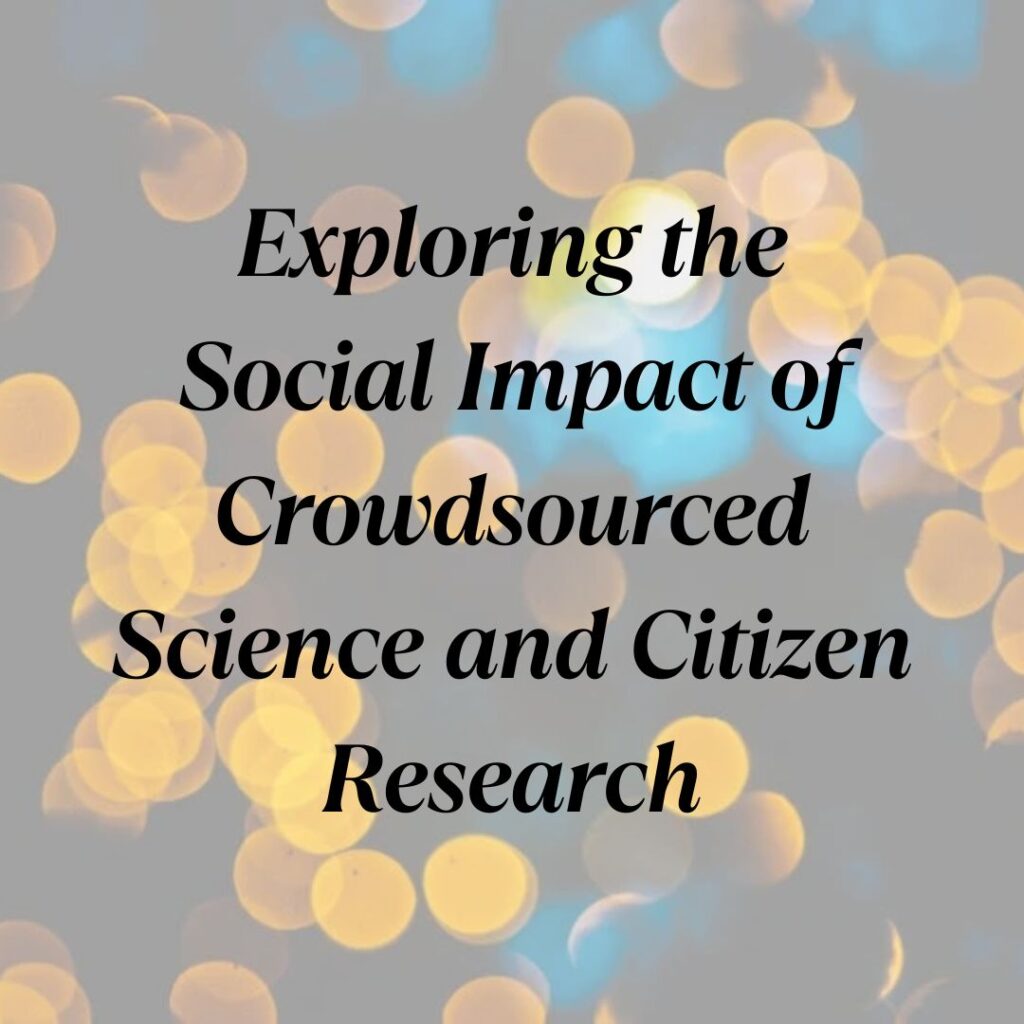In recent years, the landscape of scientific research has undergone a remarkable transformation. Traditionally confined to academic institutions and research laboratories, the pursuit of knowledge has now opened its doors to a broader community: the general public. This shift is powered by the phenomena of crowdsourced science and citizen research, where ordinary individuals contribute actively to scientific inquiry, often from their homes or local communities. This article delves into the profound social impact of these movements, examining how they shape our understanding of science, engage communities, and influence societal change.
The Rise of Crowdsourced Science
Crowdsourced science, also known as citizen science, leverages the collective efforts of volunteers to conduct scientific research. This approach democratizes science by involving non-professional scientists in various stages of the research process, from data collection and analysis to interpretation and dissemination of results. One of the pioneering examples is the Galaxy Zoo project, where volunteers classify galaxies based on telescope images, significantly accelerating the pace of astronomical research.
Engaging Communities and Fostering Collaboration
One of the most significant impacts of crowdsourced science is its ability to engage communities in meaningful scientific endeavors. By inviting participation from diverse backgrounds, these projects foster a sense of ownership and empowerment among participants. For instance, projects like eBird and iNaturalist encourage individuals to document bird sightings and biodiversity observations, respectively. These initiatives not only contribute valuable data to ecological studies but also cultivate a deeper appreciation for nature among participants.
Moreover, crowdsourced science promotes collaboration between scientists and the public. Researchers benefit from the scalability and diversity of data collected by volunteers, while participants gain insights into scientific methodologies and discoveries. This collaboration often transcends geographical boundaries, creating global networks of citizen scientists united by their passion for inquiry and discovery.
Impact on Scientific Knowledge and Innovation
The contributions of citizen scientists are increasingly recognized for their scientific rigor and relevance. In fields such as environmental science, astronomy, and biology, crowdsourced data has led to groundbreaking discoveries and novel research directions. For example, in environmental monitoring, citizen-collected data has been instrumental in identifying trends in air quality, tracking the spread of invasive species, and monitoring the impact of climate change on ecosystems.
Furthermore, crowdsourced science promotes innovation by democratizing access to scientific tools and methodologies. Platforms like Zooniverse and Foldit not only engage volunteers in research projects but also provide opportunities for individuals to contribute to solving complex scientific problems. In the case of Foldit, players have made significant strides in protein folding research, demonstrating the potential of gamification in scientific discovery.
Societal Relevance and Empowerment
Beyond its scientific implications, crowdsourced science holds profound societal relevance. By involving citizens in research related to public health, urban planning, and social issues, these initiatives address local challenges and empower communities to take informed action. For instance, projects focused on mapping pollution hotspots or monitoring water quality enable communities to advocate for environmental policies based on scientific evidence.
Moreover, crowdsourced science promotes science literacy and public engagement with scientific issues. By encouraging dialogue and collaboration between scientists and the public, these initiatives bridge the gap between academia and society. They promote a more inclusive approach to knowledge production, where diverse perspectives and insights contribute to a richer understanding of scientific phenomena.
Challenges and Future Directions
While crowdsourced science offers numerous benefits, it also faces challenges related to data quality, participant diversity, and sustainability. Ensuring the reliability and accuracy of citizen-collected data remains a critical concern, requiring robust protocols for data validation and quality control. Moreover, efforts to diversify participant demographics and engage underrepresented communities are essential to ensure equitable access to scientific opportunities.
Looking ahead, the future of crowdsourced science holds promise for further innovation and impact. Advances in technology, such as artificial intelligence and mobile applications, will enhance the scalability and efficiency of citizen research initiatives. Integrating crowdsourced data with traditional research methods will continue to enrich scientific inquiry and expand the boundaries of knowledge.
Conclusion
In conclusion, crowdsourced science and citizen research represent a transformative force in contemporary scientific practice. By harnessing the collective intelligence and enthusiasm of volunteers worldwide, these initiatives not only accelerate scientific discovery but also foster community engagement, promote societal empowerment, and advance our understanding of complex global challenges. As we navigate the evolving landscape of science and technology, the collaborative spirit of crowdsourced science stands as a testament to the power of collective action in shaping a more inclusive and informed society.
Through ongoing support and participation, individuals can contribute to the advancement of knowledge and drive positive change in their communities and beyond. Together, we can embrace the potential of crowdsourced science to address pressing issues, inspire future generations of scientists, and build a more resilient and sustainable world.
This article has explored the multifaceted impact of crowdsourced science and citizen research, highlighting its significance in the context of contemporary society. By bridging the gap between science and the public, these initiatives exemplify the transformative potential of collaborative inquiry and collective empowerment.






